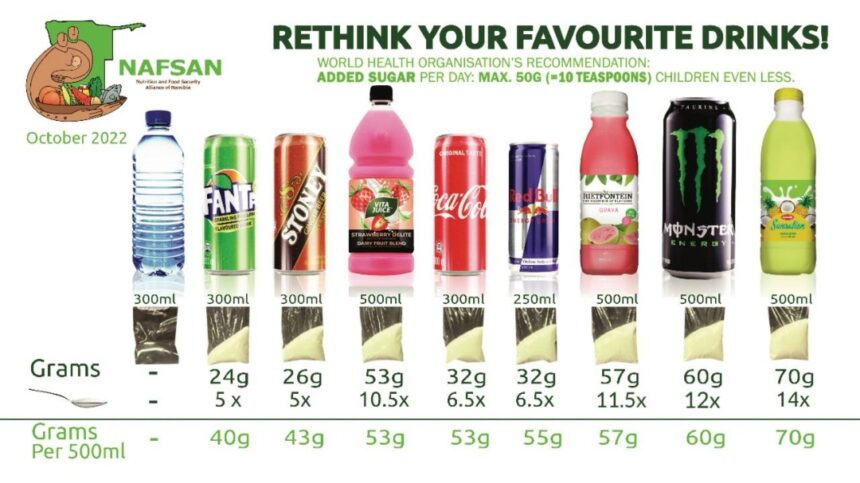Rudolf Gaiseb
Nutrition and Food Security Alliance of Namibia director Ben Schernick said reducing obesity in the country will decrease diseases and significantly lower costs for public health.
Speaking at a media engagement last Thursday, the director of the non-profit organisation said by removing sugar from the Value Added Tax (VAT) exemption list, the government would not just save on public health but generate extra revenue, while the Namibian people are likely to consume less sugar, live healthier and longer lives.
A supply of dry white or wet or dry brown granular sugar is not taxed in Namibia.
Last year, the Ministry of Finance and Public Enterprises indicated they have no plans to tax sugar due to a pending impact assessment to see how different stakeholders would be impacted.
“Many of us consume far more than this through what we eat, snack and drink, with some parents giving their small children cool drinks and undiluted juices. The consequences are often overweight/obesity and increased risks of diseases, such as diabetes (type 2), high blood pressure, stroke, cancer, depression and a shorter life span,” he stated.
Having white and brown sugar exempt from VAT is incentivising and encouraging its overconsumption.
The recent Global Nutrition Report indicates that 28.9% of adult (aged 18 years and over) women and 9.5% of adult men are living with obesity.
“The prevalence of overweight children under 5 years of age is 4.0%,” it states.
Meanwhile, the World Health Organisation recommends a global standard for sugar intake, stating that added sugars should constitute less than 10% of daily energy intake, with even greater health benefits observed when reducing this to under 5%.
This equates to about 50 grams (or 12 teaspoons) of sugar per day for an adult following a 2 000-calorie diet.
“Our diets, the food and drinks we consume, starting in very early childhood, determine our health and quality of life,” Schernick noted.
BIG
Meanwhile, the nutrition expert also called for a universal income grant.
Schernick said the universal or unconditional basic income grant (UBI) would ensure every Namibian has access to and can afford sufficient nutritious food.
He advised the new administration to appoint a joint committee comprising government experts and civil society to develop doable options to efficiently and sustainably address poverty and inequality.
“We need to have much more efficient ways to fight growing inequalities. Our current social protection mechanisms are, by the government’s own account, fragmented and inefficient. Conditional grants are administratively costly, complicated, delayed and often fail to reach everyone who needs them,” he said.
He added: “It will provide much-needed flow in rural villages and informal settlements, and this money will circulate and be spent here in Namibia, unlike those incentives currently given to large foreign investors.”
The organisation states that, while the main assumption on the impact of El Niño was adjusted, the deterioration of the food security situation is still linked to the negative impact of El Niño on crop and livestock production, price shocks, economic decline and unemployment.
The El Niño is a weather phenomenon which has caused severe drought in Southern Africa, leading to widespread crop failure, water shortages, livestock deaths, and increased food insecurity in the past years.
Other contributing factors include high unemployment, increasing poverty, and worryingly growing inequalities across the country.
The effects of climate change in Namibia will make water a necessity for human consumption and agriculture even more scarce than it already is.
Schernick emphasised that prolonged and repeated droughts affected national food production and people’s livelihoods.



